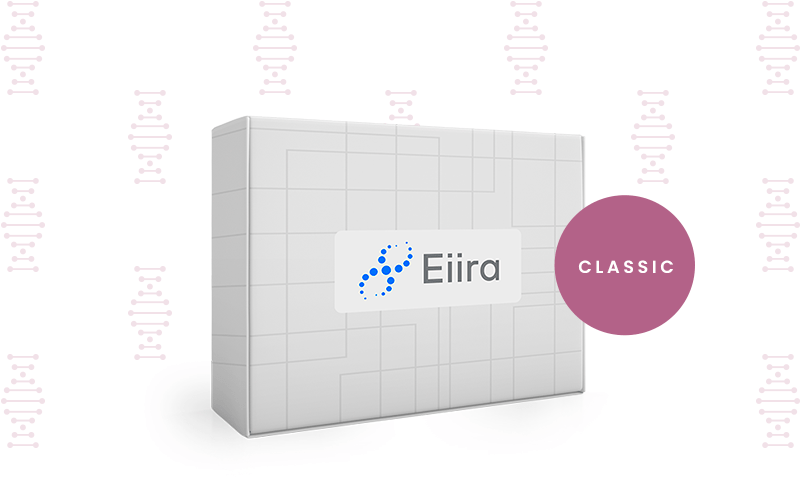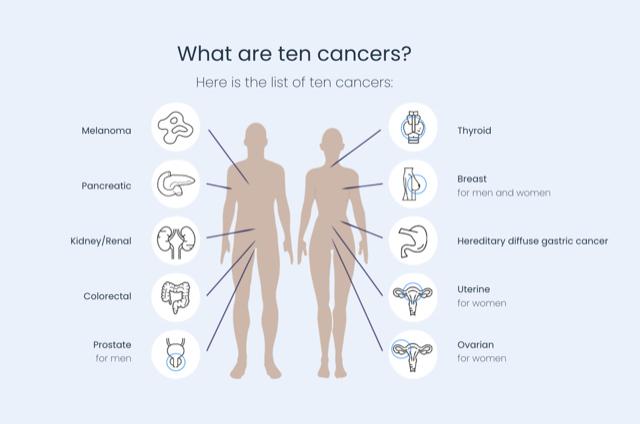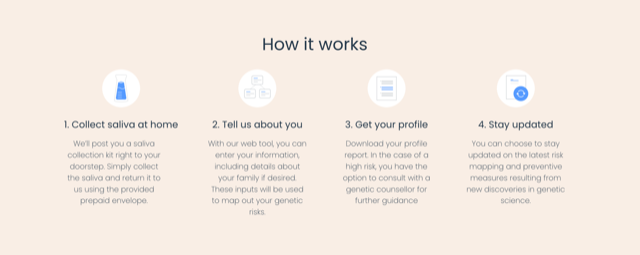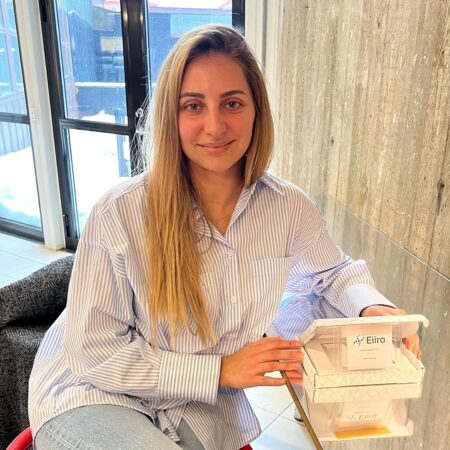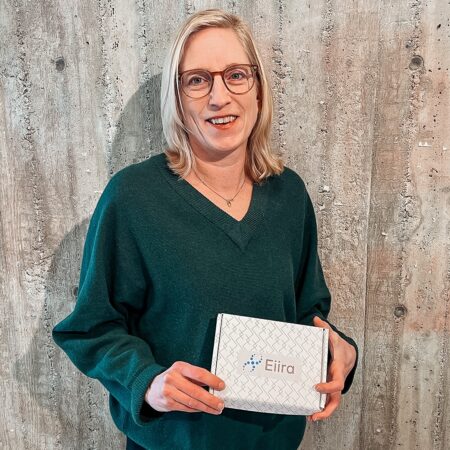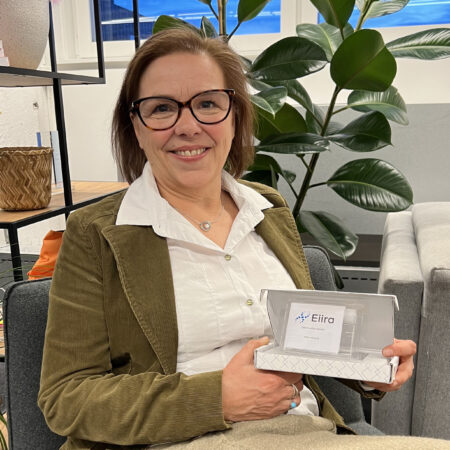Eiira Classic
4990 kr
A genetic test to prevent hereditary cancer Simple genetic test done at home Discover hereditary risks for the 10 most common cancers Take preventive action
Out of stock
- The results of your genetic tests. You can find more information in the section "What is the technology behind the genetic test?"
- Your family medical history. Given the limitation of the current genomic science, your genetic test data alone cannot predict all risks. The family’s medical history contains much hereditary information. In some cases, family history alone can predict hereditary cancer risk. Therefore family medical history is used as part of the input.
- Information on you and your medical history. Personal information such as ethnicity and ancestry roots have an impact on our hereditary risks. Your lifestyle and medical history affect the risk level.
Behind the test is one of the most advanced techniques called Whole Exome Sequence (WES). First, your saliva sample is analysed and all DNA from the germ cells responsible for generating your proteins is captured. 'Germinal' means only the DNA that you inherited from your parents at fertilisation. The analysis then looks for any pathogenic gene changes (known as variants) in the DNA data (i.e. your entire exome data).
Our report includes 50 genes that are known to cause a significantly increased risk of developing cancer. The selection of these 50 genes is based on Swedish national guidelines.
- Risk is not a diagnosis.
- Some people with high risk never have cancer.
- Similarly, people with low risk can still develop cancer.
What are the ten cancer?
Here is the list of the ten cancers:

Genes associated
To make this assessment, we have analyzed 50 genes in your DNA to identify the possible presence of disease-causing variants that are linked to an increased cancer risk. These genes have been selected based on their association with certain specific cancers or cancer syndromes. The table below shows the genes linked to the 10 different cancers covered by the analysis (i.e. the genes where we know that people carrying a disease-causing variant have an increased risk of cancer).
| Cancer type | Genes associated |
| Breast | BRCA1, BRCA2, PALB2, TP53, PTEN, CDH1, STK11, NF1, ATM, CHEK2, BARD1, RAD51C, RAD51D |
| Ovarian | BRCA1, BRCA2, PALB2, RAD51C, RAD51D, BRIP1, MLH1, MSH2, EPCAM, MSH6, PMS2 |
| Colon | MLH1, MSH2, MSH6, PMS2, EPCAM, APC, MUTYH, STK11, SMAD4, BMPR1A, PTCH, PTEN, NTHL1, POLD1, POLE, MSH3, TP53 |
| Prostate | BRCA2, HOXB13, BRCA1, MLH1, MSH2, MSH6, EPCAM, PMS2, ATM, CHEK2, PALB2, TP53 |
| Melanoma | CDKN2A, BAP1, CDK4, POT1, TERT, MITF1, MC1R, ASIP, TYR, TYRP1, TP53 |
| Kidney/Renal | VHL, FLCN, FH, MET, PTEN, SDHB, BAP1, SDHA, SDHC, SDHD |
| Thyroid | RET, APC, PTEN, DICER1, TP53 |
| Uterine | MLH1, MSH2, MSH6, PMS2, PTEN |
| Pancreatic Cancer | BRCA1, BRCA2, ATM, PALB2, MLH1 , MSH2, EPCAM, MSH6, PMS2, STK11, CDKN2A |
| Hereditary diffuse gastric cancer | CDH1, CTNNA1 |
How it works
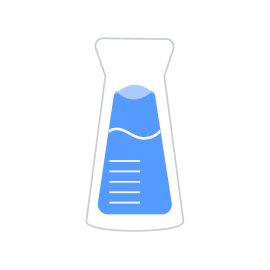
1. Collect saliva at home
We’ll post you a saliva collection kit right to your doorstep. Simply collect the saliva and return it to us using the provided prepaid envelope.
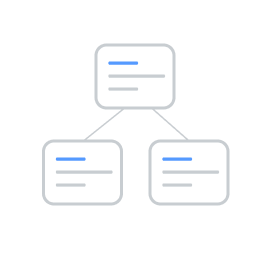
2. Tell us about you
With our web tool, you can enter your information, including details about your family if desired. These inputs will be used to map out your genetic risks.

3. Get your profile
Download your profile report. In the case of a high risk, you have the option to consult with a genetic counsellor for further guidance

4. Stay updated
You can choose to stay updated on the latest risk mapping and preventive measures resulting from new discoveries in genetic science.
Compare Eiira Classic and Premium
| Features | Eiira Classic | Eiira Premium |
|---|---|---|
| Risk mapping for the ten most common cancers | ✅ | ✅ |
| Preventive measure for ten most common cancers | ✅ | ✅ |
| Updates for ten most common cancers | ✅ | ✅ |
| Future updates to cover other diseases | Limited | Unlimited |
| Lifetime updates of the latest discoveries in genetic science | Limited | Unlimited |
| Possibility to detect rare cancer variants | ⭐⭐⭐⭐ (medium) | ⭐⭐⭐⭐⭐ (most) |
| Genetic Sequencing Technology | Whole exome sequencing (WES) | Whole Genome Sequencing (WGS) | Choose your Eiira genetic test: | 4990 kr | 9990 kr |
Eiira customers
Check out what others have already done to prevent hereditary cancers with Eiira
Data privacy & security
Eiira takes your data privacy and security seriously

GDPR
Your data is securely housed in Sweden, adhering to the EU’s strict data privacy laws.

Exclusive use
Your data, exclusively used for your risk analysis, will never be shared with third parties without your permission.

Delete any time
You are the sole owner of your data and can request to delete your data at any time.
